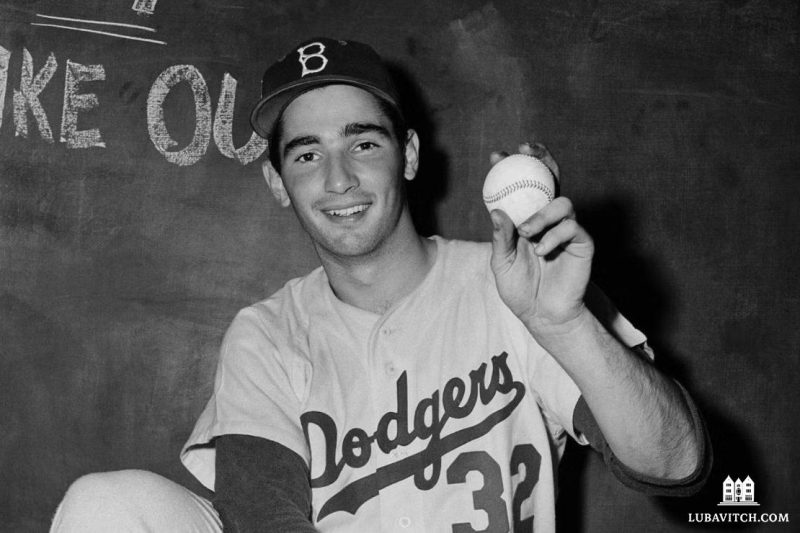
The Day Jewish Pride Won
by Tzemach Feller – Lubavitch.com
Every baseball journalist knows that you don’t talk to a starting pitcher on the day he is scheduled to make his start. Pitchers typically have very careful, practiced routines, and any disruption might throw them off their game. So even a casual greeting — let alone a conversation — is verboten.
But 60 years ago, Chabad-Lubavitch representative Rabbi Moshe Feller did just that. He met and had a conversation with a starting pitcher, hours before he was going to pitch — in the World Series.
The starter was Sandy Koufax, the ace and leader of the Los Angeles Dodgers’ pitching staff. The date was October 7, 1965 — the day after Yom Kippur. The day before, the Dodgers had begun the World Series near Minneapolis, facing the Minnesota Twins.
Game 1 of the World Series traditionally matches each team’s ace against each other, but in a decision that shocked baseball fans around the world, Koufax — who even today is considered one of the best pitchers to have played the game — sat out Game 1 in observance of Yom Kippur.
“The Left Arm of God,” as Koufax was nicknamed, had declined to pitch in observance of G-d’s mitzvot.
Four years earlier, Rabbi Moshe and Mindy Feller had founded Chabad-Lubavitch in Minnesota as emissaries of the Lubavitcher Rebbe. “Here the World Series was being played in our backyard, and the most famous player in the world — who’s doing so much for Jewish pride — was in our backyard,” Rabbi Feller related. “The Rebbe wanted to get people in the public eye doing mitzvos, and I knew I had to get that famous left arm into the mitzvah of tefillin.”
Koufax had announced weeks earlier that he wouldn’t pitch on Yom Kippur, and Rabbi Feller had ordered a pair of Tefillin for the pitcher. “I asked for the straps to be placed in the way they are for someone who puts them on the right hand, because you put Tefillin on your weaker arm, and Koufax made his living with his left arm,” Rabbi Feller said.
On the morning after Yom Kippur, the 28-year-old Rabbi Feller made his way to the S. Paul Hotel, where the Dodgers were staying. It was the day of Game 2, and Koufax would be pitching some three hours later.
“I went up to the front desk and said ‘I’m Rabbi Feller, and I want to see Mr. Koufax,’” Rabbi Feller related. “Everybody knew he was Jewish, so I must be his rabbi.”
The desk clerk allowed the rabbi to call up to Koufax’s room. “Sandy, you’ve done more for Jewish pride and observance than any rabbi’s Yom Kippur sermon,” Rabbi Feller told him. “And I’d like to make a presentation to you.”
Koufax welcomed Rabbi Feller to his room, where the rabbi gave him the tefillin, and described the impact his decision had had. “Do you know how many Jewish people didn’t go to work or to school yesterday because you didn’t pitch!”
Indeed, sixty years later, Jews around the United States remember that Yom Kippur with pride, and Koufax’s placement of his faith before his profession. “He was the key for the Dodgers’ hopes of winning the World Series as they did not have much except for Koufax,” said Frank Hessel of Daytona Beach, Florida. “We were all proud Jews because of his not pitching, as it told everyone about how important it was to be a Jew.”
Steve Silverman, from Grayslake, Illinois, was 9 years old. “My dad explained that Sandy was a proud Jew. I didn’t understand why that was a big deal at the time, but I certainly do now.”
Farrel Braunstein of S. Louis Park, Minnesota, remembers that local Jewish kids, faced with the choice whether to play high school baseball that Yom Kippur, were inspired by Koufax’s choice. “It was a big deal–which jewish kids chose to play, which kids didn’t. And here was Sandy Koufax choosing to sit out such an important game,” she recalled.
“I remember how proud my dad was and all the grown ups talking about it,” said Rachel Snyder Klein of Providence, Rhode Island. “We’ve pretty much talked about it at every Yom Kippur since then.”
The Rebbe spoke about it as well. Koufax’s decision to honor Yom Kippur above the game set a powerful example of prioritizing spiritual values in one’s life–an example, said the Rebbe, that ought to inspire parents to prioritize the spiritual education of their children.










